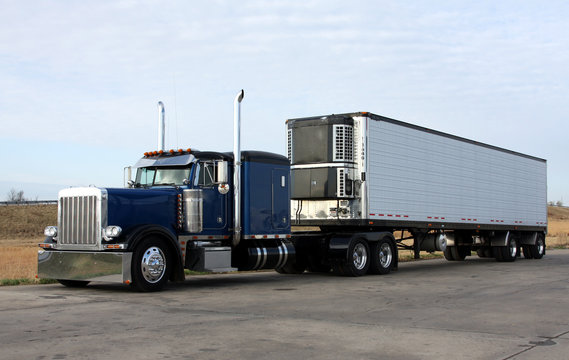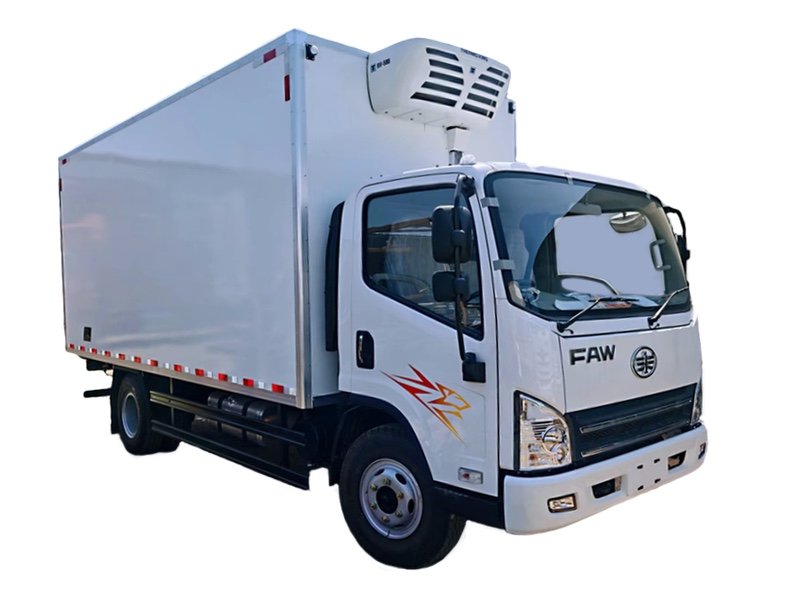Refrigerated Transportation Thermo King: The Ultimate Remedy
Refrigerated Transportation Thermo King: The Ultimate Remedy
Blog Article
Leading Technologies in Transportation Refrigeration: Enhancing Performance and Safety
The landscape of transport refrigeration is undertaking considerable change, driven by developments aimed at enhancing both efficiency and safety and security. As these technologies continue to advance, it is vital to discover their effects on operational methods and governing compliance, prompting a more detailed evaluation of just how they improve the future of transport refrigeration.
Smart Temperature Level Checking Systems
In the world of transportation refrigeration, wise temperature surveillance systems have arised as a crucial innovation for ensuring the integrity of temperature-sensitive items. These sophisticated systems take advantage of Internet of Things (IoT) technology to supply real-time data on temperature variations, making it possible for operators to maintain ideal problems throughout the supply chain. By constantly tracking the temperature level of refrigerated containers and vehicles, firms can promptly determine inconsistencies that might compromise product high quality.

Furthermore, clever tracking systems frequently include automated alerts and alerts, allowing stakeholders to react immediately to any type of possible issues. This positive method not only decreases the risk of perishing yet likewise enhances compliance with regulative standards regulating food safety and pharmaceutical transportation.
The integration of information analytics within these systems likewise assists in anticipating upkeep, aiding operators to visualize prospective devices failures prior to they take place. This ability lowers downtime and optimizes functional efficiency, ultimately leading to set you back financial savings.
Eco-Friendly Refrigerants
Smart temperature surveillance systems play a crucial duty in keeping product quality, yet the performance of transportation refrigeration likewise depends upon the option of cooling agents used. As environmental issues increase, the change in the direction of environment-friendly refrigerants has actually become vital. Traditional cooling agents, such as hydrofluorocarbons (HFCs), are well-known for their high International Warming Potential (GWP), contributing dramatically to climate change. In comparison, arising options like hydrocarbon-based cooling agents and hydrofluoroolefins (HFOs) existing lower GWP options, using both efficiency and sustainability.
These environment-friendly refrigerants not just reduce environmental influence yet likewise line up with global policies aimed at phasing out dangerous substances. Their adoption can bring about improved energy efficiency, eventually decreasing operating expenses for transportation refrigeration systems. Moreover, making use of natural refrigerants, such as ammonia and carbon dioxide, has actually gained traction as a result of their outstanding thermodynamic properties and lower ecological impact.
Buying environment-friendly refrigerants is not just a regulative compliance procedure; it stands for a calculated choice that improves brand credibility and fosters consumer loyalty. thermo king transport refrigeration. By focusing on lasting practices, firms can add to a greener future while guaranteeing the honesty of transported products
Advanced Insulation Materials
Making use of sophisticated insulation products is important for enhancing transportation refrigeration systems, as they considerably enhance energy performance and keep regular temperature control. Traditional insulation techniques typically drop short in preventing thermal transfer, causing enhanced power consumption and changing temperatures within cooled areas.
Emerging products such as vacuum cleaner insulated panels (VIPs) and aerogels supply superior thermal resistance, enabling thinner profiles without jeopardizing efficiency. VIPs, for instance, use a vacuum layer to decrease conductive and convective warm transfer, making them ideal for space-constrained applications. Aerogels, understood for their porous and lightweight framework, give extraordinary insulation while significantly decreasing general system weight.
In addition, incorporating phase modification products (PCMs) right into insulation systems can further stabilize temperatures during transportation. These products soak up and launch thermal energy, efficiently buffering against outside temperature level variants.
The assimilation of these advanced insulation materials not only decreases the operational expenses connected with power intake yet also extends the shelf life of temperature-sensitive goods. As the transport refrigeration market remains to progress, the fostering of ingenious insulation modern technologies will certainly be crucial in boosting both effectiveness and safety in refrigerated transport.
Automated Route Optimization
The performance of transportation refrigeration systems is considerably improved with automated route optimization, which leverages real-time information and advanced formulas to figure out the most effective courses for distribution. By evaluating different aspects such as website traffic patterns, weather problems, and shipment home windows, these systems can substantially minimize travel time and gas intake.
Automated path optimization reduces human error and subjective decision-making, which can bring about inadequacies. This innovation enables fleet supervisors to designate resources better, making sure that cooled goods keep their required temperature level throughout the trip. By optimizing courses, business can additionally improve customer contentment with timely distributions.
Furthermore, automated systems can adapt to unanticipated situations, such as roadway his response closures or unexpected website traffic spikes, enabling vibrant rerouting. This versatility not just safeguards the honesty of temperature-sensitive products however also adds to total operational performance.
Executing automated course optimization can result in considerable price savings while lowering the carbon footprint connected with transport. As services significantly prioritize sustainability, this advancement attracts attention as a vital component in contemporary transportation refrigeration, straightening operational goals with ecological duty. Ultimately, automated path optimization stands for a substantial development in the mission for performance and safety weblink and security in transport refrigeration.

Real-Time Data Analytics
Automated course optimization dramatically advantages from the assimilation of real-time information analytics, which supplies critical understandings into the efficiency of transportation refrigeration systems. By utilizing real-time information, transport drivers can keep an eye on temperature level fluctuations and tools performance, ensuring that subject to spoiling products are kept within needed parameters throughout transportation. This proactive strategy not just boosts the high quality of the transferred items but additionally reduces the threat of putridity and loss.

Along with improving effectiveness, real-time analytics improves safety and security by this page making certain conformity with regulatory standards for temperature level control. This not only protects public wellness however also strengthens a business's credibility - thermo king truck refrigeration. As the transport refrigeration sector progresses, the integration of real-time information analytics emerges as a keystone for driving advancement, sustainability, and operational quality
Conclusion
In verdict, the advancements in transport refrigeration substantially boost both performance and safety within the industry. Jointly, these innovations represent a vital development in transportation refrigeration, making certain compliance with regulatory standards and promoting a greener future.
The landscape of transport refrigeration is going through considerable change, driven by advancements intended at boosting both performance and safety and security.Smart temperature level surveillance systems play an essential duty in keeping item high quality, however the efficiency of transport refrigeration likewise hinges on the choice of refrigerants used. Their fostering can lead to boosted power effectiveness, eventually decreasing operating costs for transport refrigeration systems. Inevitably, automated course optimization stands for a considerable development in the quest for efficiency and safety and security in transportation refrigeration.
In final thought, the developments in transportation refrigeration dramatically boost both effectiveness and safety within the sector.
Report this page